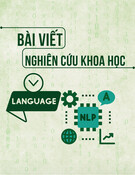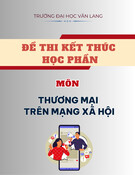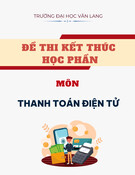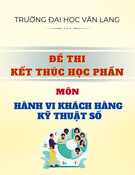
Journal of Management Science (JMAS)
Volume 7, No. 1, January 2024, pp 206-216 ISSN 2684-9747 (Online)
www.exsys.iocspublisher.org/index.php/JMAS Published by: Institute of Computer Science (IOCScience)
Journal homepage: www.exsys.iocspublisher.org/index.php/JMAS
The influence of fear of missing out (FoMO) and hedonism on
online impulse buying in Generation Z Shopee users with subjective
norm and attitude as mediation variables
Salwa Rana Deliana1, Nur Afifah2, Erna Listiana3, Ahmad Shalahuddin4, Hasanudin5
1,2,3,4,5Faculty of Economics and Business, Universitas Tanjungpura, Indonesia
A R T I C L E I N F O
ABSTRACT
Article history:
Received Nov 24, 2023
Revised Nov 25, 2023
Accepted Dec 1, 2023
Technological advances and the development of digitalization have changed
marketing activities by making it easier for consumers to make purchases via e-
commerce. The presence of e-commerce makes it easier for Generation Z to make
purchases and ends up making online impulse buying. This research aims to
determine the influence of fear of missing out (FoMO) and hedonism on online
impulse buying of Generation Z consumers using Shopee, mediated by subjective
norms and attitude. This research involved 205 people from various regions in
Indonesia who were collected online using a purposive sampling technique with a
questionnaire. Data were analyzed using Structural Equation Modeling (SEM)
AMOS 22. This research shows that FoMO and hedonism positively and
significantly effect online impulse buying Generation Z Shopee users. Meanwhile,
subjective norms and attitudes mediate the influence of FoMO and hedonism on
online impulse buying. This research can contribute to the theory of online impulse
buying in consumers in the digital era and for businesses in the digital era to be a
reference in knowing how consumer purchasing behavior patterns are on online
shopping platforms, especially in e-commerce.
Keywords:
Attitude;
FoMo;
Generation Z;
Hedonism;
Online Impulse Buying;
Subjective Norm.
This is an open access article under the CC BY-NC license.
Corresponding Author:
Salwa Rana Deliana,
Faculty of Economics and Business,
Universitas Tanjungpura,
Jl. Prof. Dr. Hadari Nawawi, Pontianak, Kalimantan Barat, 78124, Indonesia.
Email: b1021201031@student.untan.ac.id
1. Introduction
Technological advances and the development of digitalization have brought significant changes in various
life activities, especially in business to carry out marketing activities. Technology in marketing activities has
introduced e-commerce to make it easy for consumers to buy the goods they want anytime and anywhere
(Daulay, 2022). E-commerce is called electronic commerce, which refers to selling or purchasing goods or
services using an internet network specially equipped to accept orders (Devita et al., 2021). E-commerce uses
wireless purchasing carts or purchasing baskets to pay by credit card, debit card, or electronic funds transfer
(Jain et al., 2021). The existence of e-commerce makes it easier for consumers to carry out buying and selling
transactions online so that they can be done from anywhere, saving time and money. The convenience
provided by online shopping applications can significantly increase sales by 25% per year (Daulay, 2022).
More than 50% of purchases in the context of online shopping are made impulsively (Zheng et al., 2019).
Online impulse buying behavior is integral to e-commerce because competition between e-commerce
companies is increasing (Wiranata & Hananto, 2020).
The trend of using e-commerce in Indonesia continues to increase. The number of e-commerce users
in Indonesia is projected to reach 196.47 million by the end of 2023, predicted to continue to increase until
2027 (Dataindonesia, 2023). Most e-commerce users in Indonesia come from Generation Z (Dewi, 2022).
Indonesia's Generation Z mostly shops online via e-commerce because it makes it easier (IDN Times, 2022).

Journal of Management Science ISSN 2684-9747 (Online)
Salwa Rana Deliana, Slimmingfique The influence of fear of missing out (FoMO) and hedonism on online impulse
buying in Generation Z Shopee users with subjective norm and attitude as mediation variables
207
Generation Z is a group born from 1997 to 2012 (Dimock, 2019) who are very adept at shopping online via
e-commerce (Pangemanan et al., 2022). Based on the theory of generation cohort, previous research found
differences in consumer habits from different generations that Generation Z is more enthusiastic about
shopping online in e-commerce than the millennial generation (Thangavel et al., 2021). Most Gen Z purchase
products because they follow trends and are susceptible to marketing strategies implemented on online
shopping platforms (Pangemanan et al., 2022). The e-commerce platform most widely used by Indonesian
Generation Z is Shopee (Databoks, 2022).
Shopee is renowned for its brand image as a provider of competitive prices and various profitable
features such as cashback, discounts, flash sales, and many more to benefit its users (Iskamto & Gunawan,
2023). Shopee has a main selling point for internet users in its ability to facilitate intense two way
communication between buyers and sellers through its main feature, Shopee Live. Sellers speak audio in this
feature, while customers respond in writing in the comments section. Customers can immediately buy
products by clicking the orange basket icon next to the comments column (Prihatiningsih et al., 2023). The
various strategies carried out by Shopee are an effort to win the competition in e-commerce. Marketing
communication activities carried out by Shopee encourage impulse buying (Fissudur et al., 2021). The
impulse buying phenomenon is one step that can make the marketing methods used by various marketplaces,
including Shopee, successful (Kinasih & Wuryandari, 2023).
One of the characteristics of Generation Z in making decisions is that they often want to be quick
without thinking long (Nasution et al., 2022), the behavior found in Generation Z consumers is frequent
impulse buying (Purmono & Ramadania, 2021). Impulse buying is a consumer behavior in which a consumer
responds emotionally without preparation and without considering if the item is needed or simply to satisfy
curiosity (Ahmad et al., 2022). Considering the importance of impulse buying at the teenage stage it is crucial
to investigate the potential of this generation (Wolf, 2020), especially in the context of the Shopee platform.
Generation Z is vulnerable to experiencing fear of missing out (FoMO). This can happen because of
the characteristics of Generation Z such as being under the influence, constantly connected, and digital
intuitiveness. Under the influence is when individuals depend on technology, the internet, and gadgets.
Constantly connected means individuals needing to stay connected to be recognized or accepted. Digital
intuitiveness is when individuals can predict topics, online shopping, fashion statements, culinary and healthy
lifestyle patterns that have the potential to become trends (Mandas & Silfiyah, 2022).
FoMO is an emotion used to characterize consumers' concerns about missing out on opportunities or
experiences that others have had (Zhang et al., 2022), it can stimulate consumption behavior by increasing
observation of others (Kang & Ma, 2020). FoMO can influence the presence of other people's views in
consumers they experience, indicating that FoMO can increase subjective norm (Wirasukessa & Sanica,
2023). In line with research conducted by (Parker & Flowerday, 2021) proves that FoMO significantly
influences subjective norms. Meanwhile, FoMO directly and indirectly impacts attitude. People suffering
from FOMO have a significant tendency and willingness to adjust their behavior to follow and emulate
collectives or groups that represent a desire to not deviate from the mainstream and to be the same as others
(Kang et al., 2019). In line with research conducted by (Mohit et al., 2023), FoMO influences attitude.
Feelings left behind substantially influences a person's purchase decisions when shopping online (Chetioui &
El Bouzidi, 2023). This causes consumers to feel FoMO about missing opportunities that might otherwise be
missed, resulting in reduced consumer self-control, thereby increasing the likelihood of impulse purchases
(Pusenius, 2023). Contrasts with the findings (Harahap et al., 2023) reveals that FoMO influences impulse
buying and (Good & Hyman, 2020) states that consumers with high FOMO levels tend to follow the latest
trends and do not want to be left behind. Due to this fear, they tend to buy impulse to follow the current
trend.
As a generation that tends to follow trends, this indicates that Generation Z has hedonic behaviour.
The strong influence of following trends in online shop applications causes Generation Z to have a hedonistic
personality (Taqwa & Mukhlis, 2022). Hedonism refers to the irrational process of purchasing a product or
engaging in an experience, such as goofing around, having fun, or feeling better (Wang, Fu, et al., 2022).
Individuals may not always make rational decisions and act in specific ways that are limited by several
factors such as time constraints, cognitive components, or low levels of knowledge (Wang, Zhang, et al.,
2022). Thus, hedonistic behavior committed by an individual that happens frequently will create a culture in
society. This condition will give rise to subjective norms which view that hedonistic behavior is reasonable
and normal behavior (Wirasukessa & Sanica, 2023). Hedonism in consumers can improve their attitudes

ISSN 2684-9747 (Online)
JMAS, Vol. 7, No. 1, January 2024: pp 206-216
208
towards online shopping, consumers definitely look for various good products to fulfill their lifestyle needs
through various online shop (Pelealu & Huwae, 2023). Attitudes can be influenced by satisfaction with
fulfilled psychological incentives (Lien & Cao, 2014). Attitude is a psychological emotion conveyed through
assessments made by consumers. If it is positive, it tends to influence the intention to act positively (Yang &
Ahn, 2020). Consumers generally have a positive attitude towards certain products that are considered to
benefit them (Pebrianti & Rosalin, 2021). Research conducted by (Amalia & Darmawan, 2023; Lavuri, 2023)
shows that hedonism positively influences attitude. Conceptually, hedonism is the act of satisfying a person's
desire to obtain various new things, fun, enjoyment, adventure, and self-satisfaction, encouraging buyers to
make impulse purchases (Sen & Nayak, 2021). Consumers who shop online tend to do so to satisfy their
hedonic desires such as seeking experiences and feeling various happiness (Pelealu & Huwae, 2023), they
enhance sentiments of amusement that facilitate their positive emotions and, as a result, can affect consumers'
impulse purchasing behavior (Yi & Jai, 2020). Research results from (Kimiagari & Asadi Malafe, 2021;
Arbaiah et al., 2022; Hayu et al., 2023) proves that hedonism influences online impulse buying.
One theory that has been used extensively to predict online shopping behavior is theory of planned
behavior (TPB). Subject norms and attitude are two motivational factors considered based on the TPB
approach (Li et al., 2021). Subjective norms are factors that can determine behavioral intentions that directly
impact the formation of behavior (Lin Liu, 2023). Subjective norms can be defined in the context of online
purchases as the motivation customers receive from family, friends, and coworkers to purchase through
online stores. Subjective norm is a widely utilized decision-making notion because people are more inclined
to act if their role models believe they should do so (Peña-García et al., 2020). For certain behaviors,
subjective norms that encourage impulse buying reduce perceptions of self-control (Iyer et al., 2020).
Attitude is the only reliable predictor of a person's goals and behavior, so attitude is fundamental in consumer
decision making theory (Wang, Fu, et al., 2022). Research results from (Bugembe Juliet, 2010) show that the
main influence of the use of information technology or applications depends on individual attitude. This
directly influences consumers' intentions to utilize technology in online purchases, making it a useful
indicator of online purchasing habits (Lavuri et al., 2022). Consumer perceptions regarding online purchasing
lead to psychological evaluations such as positive or negative assessments and behavioral tendencies towards
online shopping (Law et al., 2016). Research conducted (Sari et al., 2021; Lavuri, 2023) stated that attitudes
influence online impulse buying.
Various previous studies (Zheng et al., 2019; Kimiagari & Asadi Malafe, 2021; Pangemanan et al.,
2022; Sudirjo et al., 2023) have researched online impulse buying. This research examines online impulse
buying, focusing on new dimensions using Generation Z as the object and adding new variations in the form
of fear of missing out (FoMO), hedonism, subjective norms, and attitudes variables so that it differs from
previous research. Specifically, this research aims to determine the influence of fear of missing out (FoMO)
and hedonism on online impulse buying in Generation Z Shopee users with subjective norms and attitudes as
mediating variables.
2. Research Method
Based on the problem formulation and conceptual framework, the research hypothesis proposed by the
researcher is as follows:
H1: FoMO influences subjective norm
H2: FoMO influences attitude
H3: FoMO influences online impulse buying
H4: Hedonism influences subjective norm
H5: Hedonism influences attitude
H6: Hedonism influences online impulse buying
H7: Subjective norms influence online impulse buying
H8: Attitude influences online impulse buying
H9: Subjective norm mediates the influence of FoMO on online impulse buying
H10: Subjective norm mediates the influence of hedonism on online impulse buying
H11: Attitude mediates the influence of FoMO on online impulse buying
H12: Attitude mediates the influence of hedonism on online impulse buying

Journal of Management Science ISSN 2684-9747 (Online)
Salwa Rana Deliana, Slimmingfique The influence of fear of missing out (FoMO) and hedonism on online impulse
buying in Generation Z Shopee users with subjective norm and attitude as mediation variables
209
Figure 1. Research framework
Research data was collected using a questionnaire with a 5 point Likert scale (1= strongly disagree,
5= strongly agree). Sampling locations were distributed throughout Indonesia via an online questionnaire.
The population of this research is Indonesian Generation Z consumers who use Shopee. A total of 205
respondents were the sample for analysis in this research selected using purposive sampling techniques.
Determination of sample size refers to the opinion (Siregar et al., 2023) states that in general, a sample size of
at least 200 data is a representative sample in SEM. The criteria for respondents are Shopee consumers who
live in Indonesia with an age range of 11-26 years and have purchased through Shopee at least once.
This research uses the Structural Equation Modeling (SEM) AMOS 22 statistical tool to analyze and
evaluate the measurement and structural models of the research constructs being built. The model fit test is
assessed based on goodness of fit parameter indices such as chi-square (χ2), CMIN/DF, Root Mean Square
Error of Approximation (RMSEA), root mean square residual (RMR), goodness of fit index (GFI), Tucker
Lewis Index (TLI), Incremental Fit Index (IFI), Comparative Fit Index (CFI), and Normal Fit Index (NFI).
Validity evaluation relies on the standardized loading factor (SLF), which must be ≥0.50 (Hair Jr et al.,
2016), and construct reliability relies on the tabulated results of construct reliability (CR) and average
variance extracted (AVE). Furthermore, the SEM analysis carried out is a structural model analysis to assess
the research hypothesis that has been developed and is accepted or rejected. SEM analysis displays the t-
value for each coefficient. The hypothesis is considered significant if the t-value is greater than the t-table at
(1.96) with a significant level of α (usually α = 0.05). Meanwhile, the Sobel test is used to determine the
indirect effect of the mediating variable.
3. Results And Discussions
Respondent Characteristics
Respondent characteristics data is presented in Table 1, totaling 205 respondents. The data obtained
shows that gender is dominated by women (89.3%), domiciled in Java (36.1%), age range 19-22 years
(64.4%), occupation as a college student (73.2%), income per month < IDR 1,000,000 (31.7%), shopping
intensity one to two times on Shopee (50.7%).
Table 1. Characteristics of respondents
Categories
Items
f
%
Gender
Man
22
10.7%
Woman
183
89.3%
Total
205
100%
Domicile
Bali
1
0.5%
Java
74
36.1%
Kalimantan
47
22.9%
Nusa Tenggara
16
7.8%
Papua
18
8.8%
Sulawesi
19
9.3%
Sumatra
30
14.6%
Total
205
100%
Age
11-15 years old
1
0.5%
16-18 years old
15
7.3%
19-22 years old
132
64.4%

ISSN 2684-9747 (Online)
JMAS, Vol. 7, No. 1, January 2024: pp 206-216
210
Categories
Items
f
%
23-26 years old
57
27.8%
Total
205
100%
Occupation
Teacher
1
0.5%
Housewife
1
0.5%
Private sector employee
35
17.1%
College Student
150
73.2%
Student
14
6.8%
Businessman
4
1.9%
Total
205
100%
Income per month
< IDR 1,000,000
65
31.7%
< IDR 2,000,000
54
26.3%
> IDR 2,000,000 - IDR 4,000,000
40
19.5%
> IDR 4,000,000 - IDR 6,000,000
19
9.3%
> IDR 6,000,000 - IDR 8,000,000
14
6.8%
> IDR 8,000,000 - IDR 10,000,000
11
5.4%
> IDR 10,000,000
2
1%
Total
205
100%
Within the last 1 month,
1 - 2 times
104
50.7%
how many times
3 - 4 times
66
32.2%
have you shopped at Shopee?
5 - 6 times
15
7.3%
> 6 times
20
9.8%
Total
205
100%
Source: Questionnaire Data Processing Results (2023)
Measurement Models and Structural Models
The results of validity and reliability tests on research indicators were obtained from the output
results of data processing via AMOS 22.
Table 2:Measurement model results
Source: Data Processing Results (2023)
Items
SLF
CR
AVE
Fear Of Missing Out
I am afraid I won not have the experience of shopping on Shopee
like other people
0.94
0.97
0.92
(FoMO)
I am afraid other people have experience shopping at Shopee more
than me
0.96
I am worried other people will have more fun than me if I do not
shop at Shopee
0.96
I am worried about not fitting in with my social group if I do not
shop at Shopee
0.97
I am worried that other people will think I am unimportant if I do not
shop at Shopee
0.96
I get anxious when I miss the opportunity to shop at Shopee
0.96
I get anxious when other people shop for new things from Shopee
0.95
Hedonism
When shopping at Shopee, I am very excited like playing
0.93
0.96
0.86
I enjoy shopping at Shopee so that I lose track of time
0.91
When shopping at Shopee, I can forget my problems
0.93
When shopping at ShopeeI feel relaxed
0.93
I shop at Shopee just for fun
0.94
Subjective Norm
People who are important to me suggested I should shop at Shopee
0.95
0.95
0.85
Many people around me shop at Shopee
0.91
I feel social pressure to shop at Shopee
0.91
The people I listen to can influence me to shop at Shopee
0.91
Attitude
Shop at Shopee that is fun
0.92
0.96
0.87
Shop at Shopee that is interesting
0.94
Shop at Shopee is a good idea
0.93
Shop at Shopee is a wise idea
0.93
I like shopping at Shopee
0.93
Online Impulse
Buying
I buy things spontaneously at Shopee
0.94
0.99
0.87
I tend to buy things I do not want to buy when shopping at Shopee
0.91
When I find something I like at Shopee, I immediately bought it
0.93
While shopping at Shopee, I often buy things without thinking twice
0.94
While shopping at Shopee, I often buy things according to how I feel
at that time
0.92
While shopping at Shopee, I often have the idea of buying now and
thinking about it after buying
0.94
















![Đề thi Chiến lược thương mại điện tử học kì 2 năm 2024-2025: [Có thể thêm thông tin chi tiết về trường/lớp]](https://cdn.tailieu.vn/images/document/thumbnail/2025/20251007/kimphuong1001/135x160/60231759811243.jpg)









